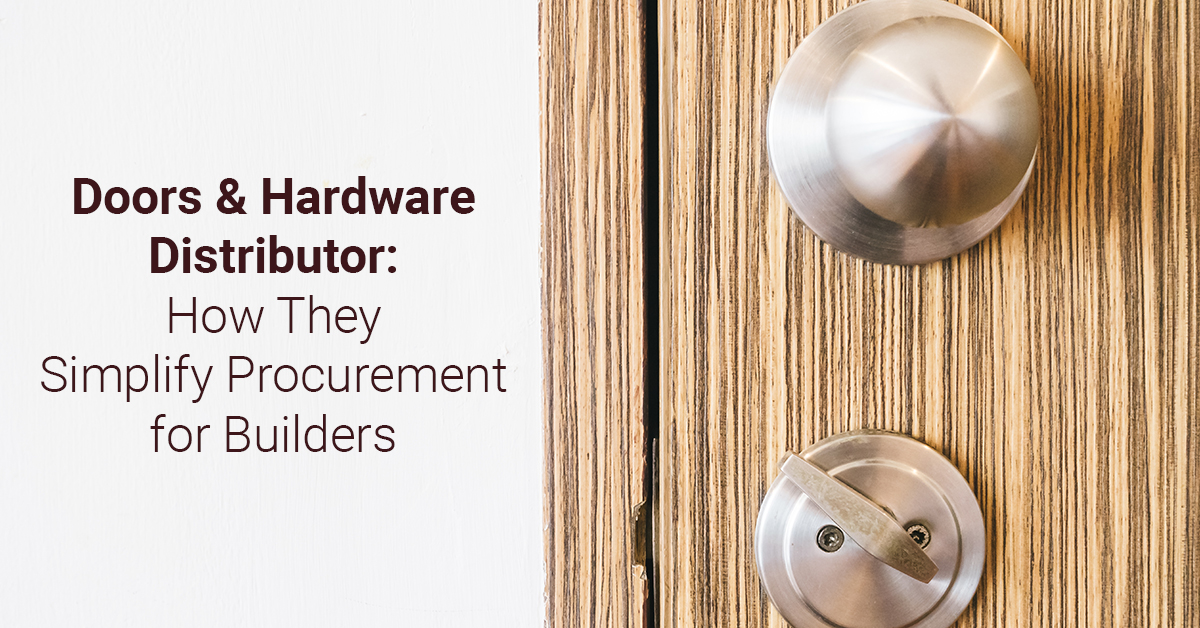Doors & Hardware Distributor: How They Simplify Procurement for Builders

Ever tried managing 47 different suppliers for a single commercial project? I have, and it nearly broke my sanity. Between tracking deliveries, coordinating warranties, and managing payment terms, I spent more time on procurement logistics than actual design work. That's when I discovered the game-changing power of working with a comprehensive door and hardware distributor.
The Strategic Role of Door and Hardware Distributors
Modern construction projects involve incredible complexity, especially when it comes to openings and access control systems. A quality door and hardware distributor serves as the central hub that coordinates all these moving pieces into a cohesive, manageable system.
Think of them as procurement project managers who specialize exclusively in doors and hardware. They understand how different products work together, which manufacturers offer the best compatibility, and how to sequence deliveries to match construction schedules.
But here's what many architects and contractors don't realize: the best door and hardware distributors aren't just order-takers. They're strategic partners who can improve project outcomes through better coordination, technical expertise, and value engineering.
Streamlining Complex Procurement Processes
Commercial door and hardware procurement involves dozens of product categories from multiple manufacturers. Doors, frames, locksets, exit devices, closers, hinges, thresholds, weatherstripping, electronic access control—each category has its own specifications, lead times, and installation requirements.
Managing this complexity through individual suppliers creates coordination nightmares. Different delivery schedules, incompatible warranties, and communication gaps between vendors can derail even well-planned projects.
A comprehensive door and hardware distributor eliminates these problems by providing single-source accountability for all opening-related products. They coordinate between manufacturers, manage inventory, and deliver complete opening packages that arrive job-ready.
Key Procurement Advantages
Working with a door and hardware distributor provides several critical advantages:
- Single point of contact for all opening-related products
- Coordinated delivery schedules that match construction timelines
- Consolidated invoicing and simplified payment processes
- Unified warranty coverage across all manufacturers
- Technical coordination between different product categories
Product Coordination and Compatibility
One of the biggest challenges in door hardware specification is ensuring compatibility between products from different manufacturers. Not all locksets work with all doors. Not all closers coordinate with all frames. These compatibility issues can create expensive field problems.
Professional door and hardware distributors maintain detailed compatibility databases that prevent these mismatches. They know which products work well together and which combinations should be avoided.
How to choose the right door hardware becomes much easier when distributors can recommend proven product combinations rather than leaving compatibility verification to chance.
Technical Expertise and Specification Support
The best door and hardware distributors employ technical specialists who understand both products and applications. These professionals can review specifications, identify potential problems, and suggest improvements before problems become expensive field issues.
They also stay current with building codes, accessibility requirements, and industry standards. Door hardware compliance requires specialized knowledge that goes far beyond basic product familiarity.
This technical support is particularly valuable during the specification development phase when hardware selections can still be optimized for performance, cost, and constructability.
Value-Added Services
Professional distributors offer services that go beyond simple product supply:
- Specification review and optimization
- Code compliance verification
- Installation coordination and support
- Training for maintenance personnel
- Long-term service and parts availability
Inventory Management and Just-in-Time Delivery
Construction schedules demand precise delivery timing. Materials that arrive too early create storage and security problems. Materials that arrive too late can delay entire projects.
Door and hardware distributors specialize in managing these timing challenges. They maintain strategic inventory levels, coordinate with manufacturers, and sequence deliveries to match actual installation schedules.
This inventory management capability is particularly valuable for large projects where storage space is limited and security is a concern. Complete opening packages can be delivered exactly when needed, reducing both storage costs and theft risk.
Cost Management and Volume Purchasing
Individual contractors rarely have the purchasing power to negotiate optimal pricing with major manufacturers. Door and hardware distributors leverage their combined volume across multiple projects to secure better pricing and terms.
But cost advantages go beyond simple volume discounts. Distributors can identify opportunities for standardization across projects, recommend value-engineered alternatives, and suggest specification modifications that reduce costs without compromising performance.
Commercial metal doors and hardware represent significant project investments that benefit from professional procurement expertise.
Hidden Cost Savings
Smart distributors identify cost savings that aren't immediately obvious:
- Standardizing on fewer product lines to reduce inventory costs
- Coordinating deliveries to minimize freight charges
- Identifying over-specification opportunities
- Suggesting phased delivery schedules that improve cash flow
Quality Control and Product Inspection
Receiving defective or damaged products on the jobsite creates delays and cost overruns. Professional door and hardware distributors implement quality control processes that catch these problems before products leave their warehouses.
This includes functional testing of hardware, finish inspection, and dimensional verification. They also coordinate with manufacturers to resolve quality issues quickly when problems are identified.
Pre-delivery inspection services ensure that products arrive job-ready and meet specified requirements. This quality control capability is particularly important for custom or special-order products that can't be easily replaced.
Installation Coordination and Field Support
Even perfect products can fail if improperly installed or poorly coordinated with other trades. The best door and hardware distributors provide field support services that ensure proper installation and performance.
This might include pre-installation meetings, technical assistance during installation, and post-installation testing. Some distributors also provide training for maintenance personnel and ongoing service support.
Integrating smart access control systems requires careful coordination between multiple trades and systems—exactly the kind of challenge that professional distributors handle routinely.
Technology Integration and Modern Solutions
Today's commercial buildings increasingly rely on integrated access control, security monitoring, and building automation systems. Door and hardware distributors who understand these requirements can recommend solutions that work seamlessly across multiple systems.
They also stay current with emerging technologies like mobile access, biometric readers, and IoT-enabled hardware. This knowledge helps them suggest future-ready solutions that accommodate reasonable technology upgrades.
Electronic access control integration requires careful coordination between door hardware, electronic components, and building systems. Professional distributors manage these relationships and ensure proper system integration.
Project Documentation and Compliance
Construction projects generate enormous amounts of documentation including submittals, shop drawings, installation instructions, warranty information, and maintenance manuals. Managing this paperwork across multiple suppliers becomes incredibly complex.
Door and hardware distributors consolidate this documentation into organized packages that simplify project management. They also verify that all products meet specified requirements and maintain proper certifications.
Why construction specifications matter becomes obvious when distributors help translate written specs into actual product selections and installation requirements.
Long-Term Service and Support
Commercial buildings have operational lifespans measured in decades. Door and hardware distributors should provide ongoing support throughout this entire lifecycle including parts availability, service expertise, and system upgrades.
This long-term relationship aspect is particularly important for specialized or custom hardware solutions. Standard products from major manufacturers typically have better parts availability, but custom solutions require specific distributor commitments.
Regional Expertise and Local Knowledge
Local building codes, climate conditions, and construction practices vary significantly across different regions. Door and hardware distributors with strong regional presence understand these local factors and can recommend appropriate solutions.
They also maintain relationships with local contractors, installers, and service technicians. These relationships become valuable when installation challenges arise or when emergency service is needed.
Supply Chain Management and Risk Mitigation
Global supply chain disruptions have highlighted the importance of reliable procurement partnerships. Door and hardware distributors with diverse supplier networks and strategic inventory can help mitigate supply chain risks.
They also provide early warning about potential product availability issues and can suggest alternative solutions when preferred products become unavailable.
Building Strategic Partnerships
The most successful projects result from genuine partnerships between builders and specialized distributors. These relationships develop over time through mutual trust, proven performance, and shared commitment to project success.
Good door and hardware distributors become trusted advisors who understand your typical project requirements, preferred products, and quality standards. They can anticipate needs, suggest improvements, and provide proactive solutions.
Selection Criteria for Distributors
Not all door and hardware distributors offer the same capabilities or service levels. When evaluating potential partners, consider these critical factors:
- Product line breadth and manufacturer relationships
- Technical expertise and specification support capabilities
- Inventory management and delivery coordination
- Quality control processes and inspection procedures
- Installation support and field service capabilities
- Long-term service commitments and parts availability
Technology Tools and Digital Integration
Modern distributors utilize digital tools that improve efficiency and communication. These might include online ordering systems, project tracking portals, and mobile apps for field coordination.
CAD libraries, specification databases, and project management tools enable more efficient collaboration between all stakeholders. These digital capabilities can significantly improve project coordination and documentation.
Conclusion
Professional door and hardware distributors transform complex procurement challenges into manageable, streamlined processes. They provide the expertise, coordination, and support services that enable successful project delivery while reducing stress and improving outcomes.
The best distributors combine comprehensive product knowledge with exceptional service capabilities, creating partnerships that benefit projects far beyond simple cost savings. They understand that their role extends from initial specification through long-term building operation.
Ready to simplify your next project's door and hardware procurement?
Partner with distributors who demonstrate genuine expertise in product coordination, technical support, and project management. The investment in professional partnership pays dividends in reduced complexity, improved quality, and successful project delivery.
